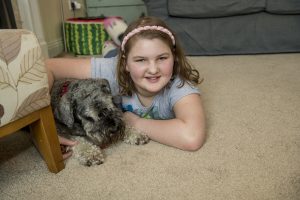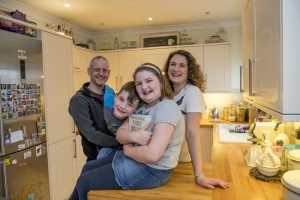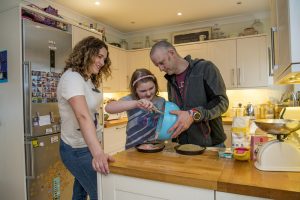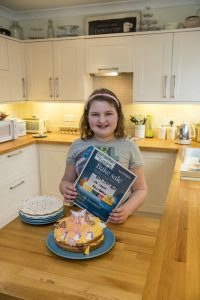Meet Belle ą the first patient to undergo an immunotherapy clinical trial at Southampton for neuroblastoma (a childhood cancer that affects the nerve cells) nine years ago.
In May 2009, Belle was in her GrannieŌĆÖs garden celebrating her second birthday. Her parents, Jane and Chris, noticed she wasnŌĆÖt herself ŌĆō not interested in playing with her friends, going on the bouncy castle or eating. Jane and Chris became concerned by her unusually quiet and withdrawn behaviour. Her mum, Jane, naturally assumed she was just coming down with something.
Jane took Belle to the doctors to get her checked out. The doctor suspected measles due to the spots in BelleŌĆÖs throat. However, on picking her up later, BelleŌĆÖs Uncle noticed her stomach was also as hard as a drum. Shortly after, and now very worried, Jane and Chris, took Belle to Poole Hospital.
A chest x-ray showed a shadow on BelleŌĆÖs lung and the hospital kept her in overnight, with suspected pneumonia. Belle had multiple blood tests and an ultrasound the next day. Finally, the consultant paediatrician told Jane and Chris that ŌĆśsomething was growing inside Belle that shouldnŌĆÖt be there.ŌĆÖ
Jane Farnhill, Belle's mumIt took a long time to register what the paediatrician was saying. I just didnŌĆÖt think children really got cancer. I remember just rocking in the room and wailing. It felt like a strange and horrible dream.
Belle and her parents were taken straight away by ambulance to University Hospital Southampton, to the Piam Brown unit, a specialist oncology and haematology centre caring for children. ŌĆ£It was pretty full-onŌĆØ remembers Chris. ŌĆ£There were lots of sick children. But it was also a very colourful happy place, which helped a lot.ŌĆØ
Belle had a series of tests and was diagnosed with the most aggressive form of neuroblastoma: neuroblastoma n-myc positive, which typically has a very poor prognosis as the tumour grows very quickly.┬ĀThe tumour was on her adrenal gland, just above the kidneys. At only two years of age, BelleŌĆÖs tumour spread from one side to the other, taking up most of abdomen and pushing on her organs.
BelleŌĆÖs cancer was at stage three/four and she was given just a 20 per cent chance of survival.
To save her life, Belle underwent intensive treatment straight away. She had five rounds of high-dosage chemotherapy and three weeks of radiotherapy. Thankfully, the treatment worked and the cancer went into remission. But Belle still needed multiple operations ą one main operation (lasting nine hours) to remove the dead tumour remains, plus four more due to other complications during treatment. Despite all of this, the chances of BelleŌĆÖs tumour being completely cured were still very low, with a high chance of it growing back once the treatment had finished.
Jane and Chris were told about the possibility of Belle going on a new immunotherapy trial*, which had just been set up at Southampton. The aim of the trial was to test whether a new antibody treatment, a form of immunotherapy, could offer improved outcomes for patients with neuroblastoma. Immunotherapy offered Belle the potential for a much better long-term prognosis and even the possibility of a cure.┬ĀBelle was the very first patient to go on this immunotherapy trial for neuroblastoma at Southampton.
Chris Farnhill, Belle's dadWe had never heard of immunotherapy but when the consultant talked us through how it works and how the treatment puts ŌĆśmarkersŌĆÖ on cancers cells so the bodyŌĆÖs own immune system can attack them, it made a lot of sense to us.
The consultant explained to Jane that┬Āeven if chemotherapy had destroyed the tumour, there could have been cancer cells lingering elsewhere. ęWe were told that immunotherapy would basically run round BelleŌĆÖs body and catch and destroy any of these escapee cancer cells, thereby reducing the chances of the cancer coming back. If thereŌĆÖs the chance you have missed even just one cell, it has to be worth doing. ItŌĆÖs amazing,ŌĆØ recalls Chris.
ŌĆ£Chemotherapy is so harsh,ŌĆØ says Jane. ŌĆ£Belle lost her hair several times, her nails fell out more than once (including after treatment had finished), she lost a layer of skin during a high dose of chemo leaving her red raw, and even her trachea came out one day ŌĆō it was┬Āterrifying to see. Immunotherapy was much gentler and easier for Belle to cope with.ŌĆØ

Immunotherapy provided the family with vital hope: if the cancer should ever come back, the immune systemŌĆÖs memory would be programmed to produce the right anti-body to destroy the cancer cells.┬Ā Fifteen months later, following all the treatment, BelleŌĆÖs tumour had reduced from 860ml to just 86ml! They removed what was left and it was all dead.
BelleŌĆÖs prognosis improved with every step. BelleŌĆÖs check-ups became less and less frequent, every three months for the first two years, every six months for the next three years, and are now just yearly check-ups.

Now, nine years on, Belle (aged 11) is still in full remission, and the chances of the tumour now coming back are very low. ŌĆ£Knowing we are eight years on feels amazing,ŌĆØ says Jane. ŌĆ£Belle does have a big scar but it is fading ŌĆō we call it her bravery line.ŌĆØ
ŌĆ£ItŌĆÖs quite mad to think Belle was the first on the trial,ŌĆØ says Chris ŌĆ£It feels really quite pioneering.ŌĆØ
ŌĆ£I feel proud to feel like we are part of the cancer immunology research at Southampton that the new Centre will continue to progress. Cancer immunotherapy is such a massive breakthrough in the cancer world ŌĆō itŌĆÖs a huge thing to be part of,ŌĆØ adds Jane,

Belle is a happy outgoing girl, now in year six at school. She loves unicorns, baking and the colour pink!
Belle is very aware how poorly she once was and is busy coming up with fundraising ideas to support the people in the new Centre, so more patients like her can benefit.
Belle recently organised a bake-off in her school and is training for a run with her dad, Chris.

* The trial that Belle was on was the European SIOPEN High Risk Neuroblastoma trial, set up to test whether a new antibody treatment, a form of immunotherapy, could help treat neuroblastoma . The antibody, which specifically targets the GD2 molecule on neuroblastoma, had already shown promise in another trial, and the trial than Belle took part in was looking to see whether the antibody was best given on its own, or with another type of immunotherapy, called IL-2. Belle was the first patient to be treated with the antibody on the trial in Southampton, led by Dr Juliet Gray .